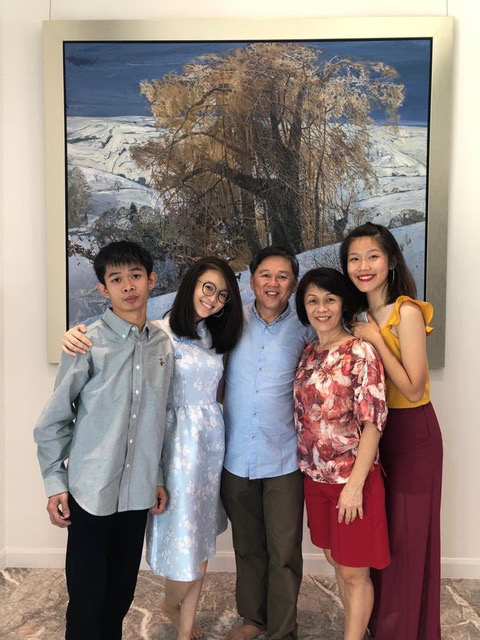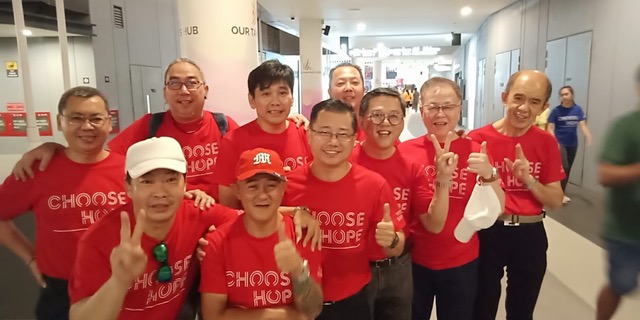
Puan Kam Fook
Men Division Leader
Thirty-six years passed in a flash! It was in 1984 when my third sister who was working in Singapore came to Kuantan, Malaysia, to visit me that I first heard about Nam-myoho-renge-kyo. She shared with me her experience after practising Nichiren Buddhism. Although I wasn’t facing any problem at that time, I readily took up faith after listening to her. After beginning the Buddhist practice, I actively participated in various activities of the Soka Gakkai Malaysia, including discussion meetings, study meetings, cultural events etcetera. From these platforms, I learned Buddhist principles, such as the law of cause and effect, and how we have control over our lives and can transform our negative karma by manifesting wisdom and courage through earnest Buddhist practice. I had heard from seniors in faith that chanting daimoku could be likened to building up our savings daily. When the needs arise, the money would be readily available. Indeed, over the 35 years of practice, I have experienced countless challenges, but have overcome all of them through daimoku—the strategy of the Lotus Sutra.
Due to the economic downturn, I came to work in Singapore in 1988. I believed that I must have a mission in Singapore that I could fulfil. I began participating in SSA activities and was appointed as a Young Men Division Group leader in 1990. I was overjoyed when I succeeded in my Singapore Permanent Resident application in 1991 and got married in the same year. The following year, I established an engineering company for warehouse automation system with some friends.
The Challenge of My Son’s Illness
In 1994, we were elated when our eldest son Jun Yan was born. However, on the night of his birth, when Jun Yan was drinking milk, he kept crying till his face turned black. He was then diagnosed with a congenital heart disease known as Hypoplastic Right Ventricle (HRV). The condition was quite severe and life-threatening, and required immediate surgery. The doctor told us that Jun Yan’s situation was complicated, and he could probably only live till around one-year-old even after the operation.
Even though I was worried at that time, I remembered this passage from the Gosho (The Writings of Nichiren Daishonin) that states, “Nam-myoho-renge-kyo is like the roar of a lion. What sickness can therefore be an obstacle?” (WND-1, p. 412) I had no doubts at that instant and was determined to fight against Jun Yan’s illness with strong faith. I immediately encouraged my wife to challenge this problem based on faith too. She started chanting with me that day. My father, too, started practising faith for the sake of his grandson. The whole family, including my brothers and sisters, chanted for Jun Yan’s good health in the spirit of “many in body, one in mind”.
Later, the doctor told us to be prepared for the worst, but we did not give up hope and continued to pray with conviction for his recovery. Another passage from the Gosho kept me going, “Suffer what there is to suffer, enjoy what there is to enjoy. Regard both suffering and joy as facts of life, and continue chanting Nam-myoho-renge-kyo, no matter what happens.” (WND-1, p. 681) The leaders and members also gave us heart-warming encouragement. They even arranged marathon chanting sessions to support us. Their sincere prayers and kindness were deeply engraved in my heart, and I am forever grateful.
Jun Yan’s condition gradually improved, though he could not drink milk on his own. My wife had to learn to tube feed him. After two and a half months stay in the hospital, Jun Yan was finally discharged, but he was still reliant on tube-feeding. One day, when we took him to a meeting at a Soka centre, we met a member who was a nurse. She advised us to try letting Jun Yan learn to drink on his own rather than from the tube, so that he would not forget how to swallow. As a result, after several attempts, Jun Yan could finally drink milk like a normal child at the age of one.
Since Jun Yan was 18-month-old, he went through a series of cardiac surgeries. In 2003, he had a Fontan operation (a procedure that involves redirecting blood flow from the lower body to the lungs). After the operation, he was placed on Warfarin, a blood-thinning drug, so we had to constantly ensure that he did not get injured. We overcame one operation after another with unwavering faith and daimoku.
In 2005, when Jun Yan was 11-year-old, he was admitted to the hospital because of vomiting. However, unexpectedly he suffered from a sudden stroke three days after he was admitted, immobilising the right side of his body. The doctor said that Jun Yan would require physiotherapy and occupational therapy for a long period of time, and the road to recovery would be long and challenging. He would have to relearn some basic daily movements. It was tormenting as parents to see the plight of Jun Yan. In those difficult times, we encouraged ourselves with our mentor President Ikeda’s guidance. President Ikeda says that by remaining undefeated, not giving up hope and persevering till the very end when one encounters difficulties, one will eventually achieve final victory.
The Sunshine Aunties who took care of Jun Yan in the Primary Division, as well as the members of the Golden Lion Dance Troupe, came to encourage and cheer him up. My father also chanted eight to nine hours of daimoku for Jun Yan daily. On the other hand, I would rush home to chant with my wife every day as soon as I completed my work. With the support of my family and the encouragement of the members, Jun Yan gradually recovered.
Although Jun Yan had learning difficulties due to stroke, he managed to complete the Primary School Leaving Examination (PSLE) and went to Northlight Secondary School. During the three years in secondary school, he had caring teachers who encouraged him. The teachers praised him for being a conscientious, hardworking and considerate person, who can work in a team. He also received numerous awards from the school. Jun Yan then continued to study at the Institute of Technical Education. He became very independent and even looked for jobs on his own. He is working as a retail assistant currently. We are immensely grateful to have witnessed the growth of Jun Yan.
Victory in My Human Revolution
SGI President Ikeda said, “In life and in the struggle for kosen-rufu, all our sufferings and earthly desires are fuel for our enlightenment. The tougher the challenges we face, the greater the joy and benefit and the higher the life condition we will ultimately savour.”
Since 2011, I had been facing some challenges in my business. One of the shareholders of my company started to show little interest in his work, coming to work late and leaving early. He was unreasonable and his attitude at work was horrible. He would often scold our employees and even offend the customers.
I decided to put into practice what our mentor President Ikeda has repeatedly emphasised, “No strategy surpasses that of the Lotus Sutra.” Hence, I woke up earlier every day and chanted an hour of daimoku before going to work. In the process, I actualised my human revolution. I carried out heart-to-heart dialogues with my employees and strove to provide our customers sincere and reliable services. Through these efforts, I was able to retain the team of employees and gain the trust of our customers.
After challenging the problem for four years, the shareholder suddenly requested to withdraw his shares in July 2014, offering to sell his shares to me as he wanted to retire early. Fortunately, his withdrawal did not inflict any loss on the company; instead, the staff became more united, and the company grew steadily.
Moving forward, I resolve to pray even more earnestly for my children to become capable people for kosen-rufu, who will contribute to the well-being of the common people and society. I realised it is through striving for the happiness of others, that we can achieve true happiness for ourselves. Therefore, I am determined to practise Nichiren Buddhism in accord with the guidelines of the organisation, work in harmonious unity with the four division leaders in my chapter to advance the cause of kosen-rufu, and foster successors, in order to live a life without regrets.
(Adapted from SSA Times issue 611)

